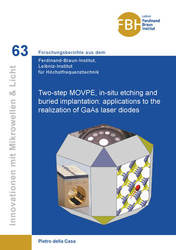| Areas | |
|---|---|
| Serie de libros (96) |
1381
|
| Nachhaltigkeit |
3
|
| Gesundheitswesen |
1
|
| Letra |
2370
|
| Ciencias Naturales |
5408
|
| Matemática | 229 |
| Informática | 319 |
| Física | 980 |
| Química | 1364 |
| Geociencias | 131 |
| Medicina humana | 243 |
| Estomatología | 10 |
| Veterinaria | 108 |
| Farmacia | 147 |
| Biología | 835 |
| Bioquímica, biología molecular, tecnología genética | 121 |
| Biofísica | 25 |
| Nutrición | 45 |
| Agricultura | 1005 |
| Silvicultura | 201 |
| Horticultura | 20 |
| Ecología y conservación de la tierra | 148 |
| Ciencias Ingeniería |
1795
|
| General |
98
|
|
Leitlinien Unfallchirurgie
5. Auflage bestellen |
|
Erweiterte Suche
Two-step MOVPE, in-situ etching and buried implantation: applications to the realization of GaAs laser diodes (Volumen 63) (Tienda española)
Pietro della Casa (Autor)Previo
Lectura de prueba, PDF (3,1 MB)
Indice, PDF (59 KB)
This work is about two-step epitaxial growth using metalorganic vapor-phase epitaxy (MOVPE) for the realization of edge-emitting near-infrared laser diodes. The fabricated gallium arsenide-based devices fall into two categories: high-power lasers (watt range, multimodal) and tunable lasers (milliwatt range, monomodal).
Common to both cases is that surface contamination – particularly that due to oxygen – needs to be removed before regrowth. Thus, in-situ etching with carbon tetrabromide (CBr4) is first studied. The experimental results include kinetic data, the effects of different etching conditions as well as substrate characteristics, and the effectiveness in reducing surface contamination.
These investigations pave the way to devices based on 2-step epitaxy combined with in-situ etching. Correspondingly, thermally-tuned SG-DBR lasers operating around 975 nm have been successfully realized, obtaining a tuning range of 21 nm. In addition, the possibility of using electronic tuning in similar devices has been explored.
High-power broad-area lasers have also been realized, using two-step epitaxy combined with ex-situ and in-situ etching, to create a buried, shallow “mesa” containing the active zone. This approach allows introducing lateral electrical and optical confinement, and – simultaneously – non-absorbing mirrors at the laser facets.
Additionally, a different strategy to create a buried current aperture is presented, which is based on ion implantation followed by epitaxial regrowth. This enables to improve device performance and simultaneously introduce non-absorbing mirrors at the facets with correspondingly increased reliability.
| ISBN-13 (Impresion) | 9783736973978 |
| ISBN-13 (E-Book) | 9783736963979 |
| Formato | A5 |
| Idioma | Inglés |
| Numero de paginas | 250 |
| Laminacion de la cubierta | mate |
| Edicion | 1 |
| Serie | Innovationen mit Mikrowellen und Licht. Forschungsberichte aus dem Ferdinand-Braun-Institut, Leibniz-Institut für Höchstfrequenztechnik |
| Volumen | 63 |
| Lugar de publicacion | Göttingen |
| Lugar de la disertacion | Berlin |
| Fecha de publicacion | 25.03.2021 |
| Clasificacion simple | Tesis doctoral |
| Area |
Física
Física de materia condensada ( incluyendo física de cuerpos solidos, optica) |
| Palabras claves | Laser, semiconductors, gallium arsenide, epitaxy, MOVPE, ion implantation, Lasers, Halbleiter, Galliumarsenid, Epitaxie, Ionenimplantation, metallorganische Gasphasenepitaxie, organometallic gas phase epitaxy, AlGaAs, Tetrabrohmkohlenstoff, Tetrabromocarbon, Zincblende, Reaktorkammer, reactor chamber, in-situ etching, In-situ-Ätzen, GaAs-etching, GaInP, SG-DBR lasers, SG-DBR Laser, Oberflächenverunreinigungen, surface contamination, epitaktisch, epitaxial, Sauerstoff, oxygen, Ätzen, etching, Kohlenstofftetrabromid, Substrate, substrate, Zinkblende, semiconductors, Optoelektronik, optoelectronics, Reaktorkammer, reactor chamber, Gasmischsystem, gas mixing system, Chlorverbindungen, chlorine compounds, Helligkeit, brightness, Strahlqualität, beam quality, elektrischer Überlastungstest, electrical overstress test, Quanten, quantum-well, Quantenschächte, Silizium, Regrowth, PI-Kurven, PI curves, Leckstrom, leakage current, Slope-Effizienz, slope efficiency, optische Absorption, optical absorption, Nahfeld, near-field, Fernfeld, far-field, Kristallstruktur, crystal structure, Wurtzit-Kristallstrukturen, Wurtzite crystalline structures, Zinkblende-Kristallfacetten, zincblende crystal facets, Silizium-DX-Zentrum, silicon DX center, Ladungsträgertransport, |








